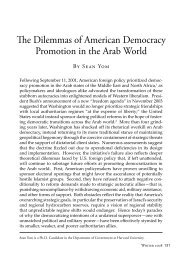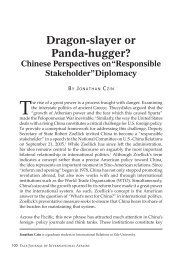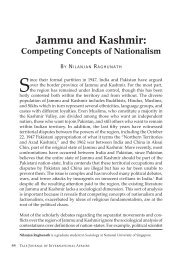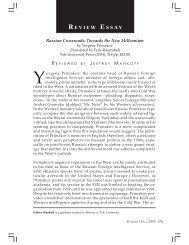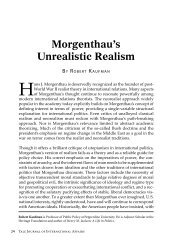Women and the Global Economy - Yale Journal of International Affairs
Women and the Global Economy - Yale Journal of International Affairs
Women and the Global Economy - Yale Journal of International Affairs
You also want an ePaper? Increase the reach of your titles
YUMPU automatically turns print PDFs into web optimized ePapers that Google loves.
WOMEN AND THE GLOBAL ECONOMY<br />
planning. They are also incorporating women-owned businesses into <strong>the</strong>ir supply<br />
chains, tailoring products for women, <strong>and</strong> accessing new customers through female<br />
distribution models—<strong>and</strong> beginning to realize results.<br />
Doing Good <strong>and</strong> Doing Well<br />
Tupperware is one such company that is deploying its assets to improve <strong>the</strong> lives<br />
<strong>of</strong> women in emerging markets. Tupperware is <strong>the</strong> iconic American company that<br />
literally invented <strong>the</strong> party-based sales model—by women, for women—back in <strong>the</strong><br />
1950s when fewer than a third <strong>of</strong> American women worked outside <strong>the</strong> home. Today,<br />
Tupperware is replicating that model overseas, <strong>and</strong> driving social change in emerging<br />
markets around <strong>the</strong> world. Eighty-five percent <strong>of</strong> company revenue comes from outside<br />
<strong>the</strong> United States, <strong>and</strong> nearly 50 percent comes from emerging markets such as Egypt,<br />
India <strong>and</strong> Indonesia. In India alone, its all-female sales force numbers more than<br />
50,000, with new consultants able to make as much as teachers <strong>and</strong> nurses. 5 These<br />
Tupperware ladies provide critical income for <strong>the</strong>ir families, with many reporting that<br />
<strong>the</strong>ir earnings pay for school fees, better healthcare <strong>and</strong> improved nutrition for <strong>the</strong>ir<br />
children. As breadwinners, managers <strong>and</strong> trainers, Tupperware ladies enjoy greater<br />
self-confidence <strong>and</strong> stature <strong>and</strong> become leaders in <strong>the</strong>ir communities.<br />
St<strong>and</strong>ard Chartered Bank (SCB) is ano<strong>the</strong>r example <strong>of</strong> a company that underst<strong>and</strong>s<br />
<strong>the</strong> positive effect <strong>of</strong> women’s empowerment on economic development, <strong>and</strong> its own<br />
bottom line. A financial services company whose history is intertwined with <strong>the</strong><br />
British Empire, St<strong>and</strong>ard Chartered generates 90 percent <strong>of</strong> its income today from<br />
operations in seventy-one countries in Africa, <strong>the</strong> Middle East <strong>and</strong> Asia. In <strong>the</strong> last<br />
three years, it has provided $540 million <strong>of</strong> credit <strong>and</strong> financial instruments to sixtythree<br />
micr<strong>of</strong>inance institutions (MFIs) across Asia, <strong>the</strong> Middle East, <strong>and</strong> Africa. 6 It<br />
also focuses on agricultural finance due to <strong>the</strong> large growth potential <strong>and</strong> important<br />
development role agriculture plays in many countries where <strong>the</strong> bank operates. In<br />
addition, SCB is helping finance a shift toward a low-carbon economy, in accordance<br />
with a five-year clean technology <strong>and</strong> renewable energy commitment it made at <strong>the</strong><br />
2007 Clinton <strong>Global</strong> Initiative. 7 Although SCB does not explicitly state that <strong>the</strong>se<br />
measures have been adopted to empower women in developing countries, women are<br />
<strong>the</strong> group that st<strong>and</strong>s to benefit most from <strong>the</strong>m, as small businesses <strong>and</strong> agriculture<br />
are female-dominated sectors in many countries where SCB operates. Clean technology<br />
<strong>and</strong> renewable energy sources can help women avoid many <strong>of</strong> <strong>the</strong> health <strong>and</strong> o<strong>the</strong>r<br />
hazards associated with traditional methods <strong>of</strong> cooking, heating, <strong>and</strong> agriculture.<br />
In a fur<strong>the</strong>r move to differentiate itself, SCB some years ago decided to focus on women<br />
as customers <strong>and</strong> clients in markets where <strong>the</strong>y have traditionally been underserved.<br />
In December 2008, SCB launched a women’s empowerment program to enhance<br />
financial literacy, financial planning, investment <strong>and</strong> capacity building for women<br />
owners <strong>of</strong> small businesses, aiming to reach 5,000 women in Asia by 2011. 8 In India<br />
<strong>and</strong> Pakistan, <strong>the</strong> bank operates all-female branches; in Africa, it runs its “Diva Club,”<br />
a savings program that encourages women to save in groups <strong>and</strong> facilitates networking<br />
among female clients. SCB sees <strong>the</strong>se programs as valuable in building customer loyalty<br />
<strong>and</strong> creating a first-mover advantage for <strong>the</strong> bank. Along <strong>the</strong> way, <strong>the</strong>se initiatives also<br />
Winter 2011 27



